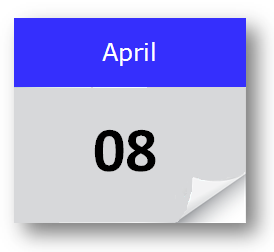The 8th of April is celebrated around the world as Buddha’s birthday and is observed as a national holiday in Hong Kong, South Korea and Macau. The 8th of April is the 98th day of the year (Gregorian calendar) or 99th in a leap year.
On the 8th of April 1904
Britain and France bury their long term rivalry with the signing of the Entente Cordiale on the 8th of April 1904. This treaty was the beginning of a friendship between the countries and mutual respect for each others territories in Africa (Briton’s control of Egypt and France’s control of Morocco). This first signing didn’t agree to a military alliance against outside aggressors but this signing did lead to that end. When German Kaiser Wilhelm met with the Moroccan Sultan and pledged his support to test the bond between Great Britain and France, Britain supported France. In 1911 both France and Germany sent troops to Morocco and this led to Britain and France signed an extension of the Entente Cordiale which called for a military alliance with the two great powers. France was already allies with Russia and this created two power blocs in Europe with Great Britain, France and Russia on one side (would become known as the “Allied Forces”) and Germany, Austro-Hungary, and Italy on the other. It was these alliances, after the assassination of Prince Ferdinand of Austria, which led to World War I when many more alliances were made and broken.
On the 8th of April 563BC
Buddhists around the world celebrate the birth of their spiritual leader Buddha who is believed to have been born on the 8th of April 563BC. Gautama Buddha was born as Prince Siddhartha in India (also part of modern day Nepal) in his fathers Kingdom of Sakyas. It was predicted at his birth that the young prince would one day become a great leader that would unite the world or he would become a Buddha (meaning ‘Awakened’). The story says that Siddhartha’s father, King Suddhodana, ordered that his son live a life of total seclusion from the world outside the palace walls, but Siddhartha left the palace and wondered into his father’s kingdom. Here he witnessed an old man, a sick man, and a corpse (as well as a monk) for the first time and this dramatic contrast to the world he believed was normal affected him greatly. The next day he left the Palace and ventured out into the world in the hopes of finding a way to relieve the worlds suffering. He believed the monk he saw on his first journey out of the palace was a sign. He sought the life of a holy man and for several years Siddhartha studied and meditated on the problems of the world. The holy life didn’t seem to give him the answers he sought and when he met an ascetic (a spiritual person that believes extreme self-denial of material precessions and fasting will bring them closer to god). He began a life of self discipline and self inflicted hardship which would last for several more years, until one day he was offered a bowl of rice from a young girl. It is said that was the turning point when Siddhartha determined that the life of the ascetic was not right either and in fact a balance between the harsh life of self discipline and the luxury he once knew was what was needed to find enlightenment; he called this way of life “the Middle Way”. That night he sat under the Bodhi tree and meditated until dawn. And it was there under that tree that Siddhartha achieved the awakening and became Buddha.
